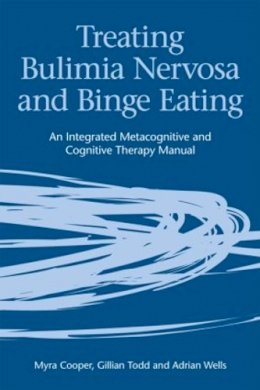
Stock image for illustration purposes only - book cover, edition or condition may vary.
Treating Bulimia Nervosa and Binge Eating
Cooper, Myra; Todd, Gillian; Wells, Adrian
FREE Delivery in Ireland
Description for Treating Bulimia Nervosa and Binge Eating
Paperback. Explains how cognitive therapy can be used to treat those suffering from bulimia nervosa. This book incorporates case examples offering explanations of the treatment process, questionnaires, worksheets and practical exercises for the client, which provides a framework and focus for therapy. Num Pages: 264 pages, 69 black & white tables, 4 black & white line drawings. BIC Classification: JM; MMJT. Category: (P) Professional & Vocational; (UP) Postgraduate, Research & Scholarly; (UU) Undergraduate. Dimension: 244 x 175 x 20. Weight in Grams: 488.
Treating Bulimia Nervosa and Binge Eating explains how cognitive therapy can be used to treat those suffering from bulimia nervosa. The manual provides a step-by-step treatment guide, incorporating a number of case examples offering detailed explanations of the treatment process, questionnaires, worksheets and practical exercises for the client, which will provide a framework and focus for therapy. The authors use existing techniques, as well as new integrated cognitive and metacognitive methods developed from their recent research, to take the therapist from initial assessment to the end of treatment and beyond, with chapters covering:
- engagement and motivation
- case formulation and socialisation
- detached mindfulness strategies
- positive ... Read moreand negative beliefs.
This practical guide will allow those treating patients with bulimia nervosa to take advantage of recent developments in the field and will be an essential tool for all therapists working with this eating disorder.
Show Less
Product Details
Publisher
Taylor & Francis Ltd United Kingdom
Place of Publication
London, United Kingdom
Shipping Time
Usually ships in 4 to 8 working days
About Cooper, Myra; Todd, Gillian; Wells, Adrian
Myra Cooper is senior research tutor at the Oxford Doctoral Course in Clinical Psychology, University of Oxford. Gillian Todd is based in the Department of Psychiatry at the University of Cambridge. Adrian Wells is Professor of Clinical and Experimental Psychopathology at the University of Manchester.
Reviews for Treating Bulimia Nervosa and Binge Eating
"Every clinician working with the eating disorders will know a bulimia nervosa sufferer like Jessica, Angela or Bethany. This book gives practical advice about how to work with such patients, incorporating existing methods and building on them with new methods from the authors' clinical research and experience. It should be in the collection of every psychological therapist working with bulimia ... Read morenervosa." - Glenn Waller, Visiting Professor of Psychology, Institute of Psychiatry, King's College London, & Consultant Clinical Psychologist, Vincent Square Eating Disorders Service, CNWL NHS Foundation Trust, UK "Underpinned by a strong and evidence-based model, this therapist guide is brimming with solid practical advice and detailed guidance on how to implement particular therapeutic strategies and deal with hurdles and challenges along the way. Accompanying worksheets and therapeutic aide-memoirs are excellent. Both new and expert therapists will find this book highly useful." - Ulrike Schmidt, Professor of Eating Disorders, Institute of Psychiatry, South London and Maudsley NHS Trust, UK "Treating Bulimia Nervosa and Binge Eating is an excellent, practical handbook for clinicians in helping their patients overcome bulimia nervosa. The authors - Myra Cooper, Gillian Todd, and Adrian Wells - provide an innovative, powerful new approach - metacognitive therapy that can help patients disentangle themselves from their problematic thoughts and urges. This book is filled with clinical vignettes, behavioral experiments, metacognitive exercises, treatment tips, self report forms and informative schematics that will be immensely valuable in the real-world setting that clinicians encounter. This is an important contribution to helping us overcome a difficult clinical problem. The authors should be congratulated for providing us with a break-through in how to conceptualize and treat this problem." - Robert L. Leahy, Director, American Institute for Cognitive Therapy, USA Show Less

